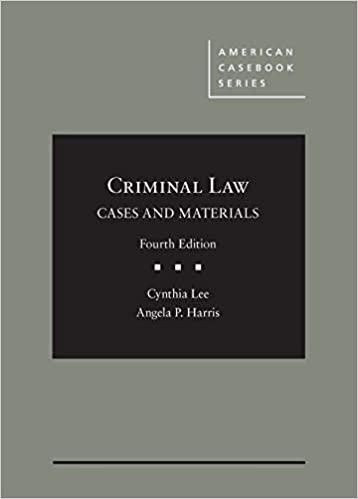Question
Massachusetts v. EPA 549 U.S. 497 (2007) Who Has Jurisdiction over Hot Air? FACTS On October 20, 1999, a group of 19 private organizations (petitioners)
Massachusetts v. EPA
549 U.S. 497 (2007)
Who Has Jurisdiction over Hot Air?
FACTS
On October 20, 1999, a group of 19 private organizations (petitioners) filed a rulemaking petition asking EPA to regulate "greenhouse gas emissions from new motor vehicles under 202 of the Clean Air Act." These organizations argued that greenhouse gas emissions have significantly accelerated climate change; and that "carbon dioxide remains the most important contributor to [man-made] forcing of climate change."
Fifteen months after the petition was filed, the EPA requested public comment on "all the issues raised in [the] petition." The EPA received more than 50,000 comments over the next five months.
On September 8, 2003, EPA entered an order denying the rulemaking petition because (1) the Clean Air Act does not authorize EPA to issue mandatory regulations to address global climate change; and (2) even if the agency had the authority to set greenhouse gas emission standards, it would be unwise to do so at this time. Massachusetts, other states, and private organizations filed suit challenging the EPA denial as arbitrary and capricious, violative of the APA, and ultra vires because of statutory mandates for EPA action. The court of appeals dismissed the appeal from the agency denial and the Supreme Court granted certiorari.
JUDICIAL OPINION
STEVENS, Justice
In essence, EPA concluded that climate change was so important that unless Congress spoke with exacting specificity, it could not have meant the agency to address it.
While it may be true that regulating motor-vehicle emissions will not by itself reverse global warming, it by no means follows that we lack jurisdiction to decide whether EPA has a duty to take steps to slow or reduce it.
The Clean Air Act's sweeping definition of "air pollutant" includes "any air pollution agent or combination of such agents, including any physical, chemical ... substance or matter which is emitted into or otherwise enters the ambient air...." The statute is unambiguous. If EPA makes a finding of endangerment, the Clean Air Act requires the agency to regulate emissions of the deleterious pollutant from new motor vehicles.
EPA finally argues that it cannot regulate carbon dioxide emissions from motor vehicles because doing so would require it to tighten mileage standards, a job (according to EPA) that Congress has assigned to DOT. But that DOT sets mileage standards in no way licenses EPA to shirk its environmental responsibilities. EPA has been charged with protecting the public's "health" and "welfare," a statutory obligation wholly independent of DOT's mandate to promote energy efficiency. The two obligations may overlap, but there is no reason to think the two agencies can- not both administer their obligations and yet avoid inconsistency.
Because greenhouse gases fit well within the Clean Air Act's capacious definition of "air pollutant," we hold that EPA has the statutory authority to regulate the emission of such gases from new motor vehicles.
In short, EPA has offered no reasoned explanation for its refusal to decide whether greenhouse gases cause or contribute to climate change. Its action was therefore "arbitrary, capricious, ... or otherwise not in accordance with law." We need not and do not reach the question whether on remand EPA must make an endangerment finding, or whether policy concerns can inform EPA's actions in the event that it makes such a finding. We hold only that EPA must ground its reasons for action or inaction in the statute.
The judgment of the Court of Appeals is reversed, and the case is remanded.
DISSENTING OPINION
Chief Justice ROBERTS, with whom Justice SCALIA, Justice THOMAS, and Justice ALITO join dissenting Global warming may be a "crisis," even "the most pressing environmental problem of our time." Indeed, it may ultimately affect nearly everyone on the planet in some potentially adverse way, and it may be that governments have done too little to address it. It is not a problem, however, that has escaped the attention of policymakers in the Executive and Legislative Branches of our Government, who continue to consider regulatory, legislative, and treaty-based means of addressing global climate change.
This Court's standing jurisprudence simply recognizes that redress of grievances of the sort at issue here "is the function of Congress and the Chief Executive," not the federal courts. I would vacate the judgment below and remand for dismissal of the petitions for review.
Justice SCALIA, with whom THE CHIEF JUSTICE, Justice THOMAS, and Justice ALITO join, dissenting. I simply cannot conceive of what else the Court would like EPA to say.
The Court's alarm over global warming may or may not be justified, but it ought not distort the outcome of this litigation. This is a straightforward administrative-law case, in which Congress has passed a malleable statute giving broad discretion, not to us but to an executive agency. No matter how important the underlying policy issues at stake, this Court has no business substituting its own desired outcome for the reasoned judgment of the responsible agency.
CASE QUESTIONS
List the arguments the dissent makes against requiring the EPA to take action on greenhouse gases. What do you learn about the role of the issue of global warming in the dissent's analysis of the case vs. the analysis of the majority?
Step by Step Solution
There are 3 Steps involved in it
Step: 1

Get Instant Access to Expert-Tailored Solutions
See step-by-step solutions with expert insights and AI powered tools for academic success
Step: 2

Step: 3

Ace Your Homework with AI
Get the answers you need in no time with our AI-driven, step-by-step assistance
Get Started


